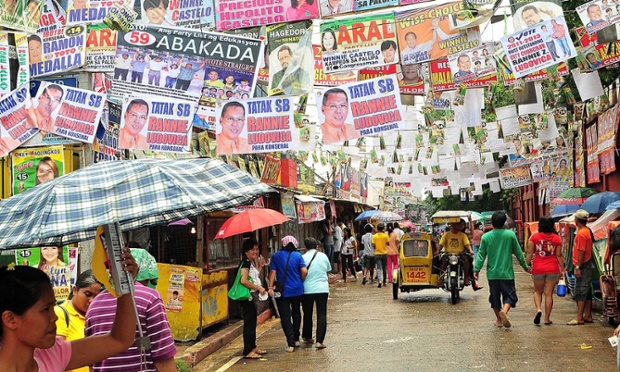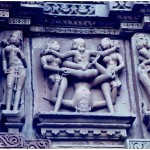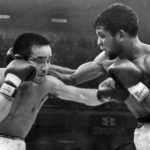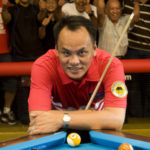SMILING FACES AND POP DITTIES IN ‘DA ‘HOOD.
A primer on how foreigners can survive and actually enjoy the upcoming Philippine elections.

Smiling faces everywhere promise a bright future for Philippine voters(Photo by Joseph Bonifacio)
BY TED LERNER
The task that I am about to undertake does not come easy. In fact I’m nervous as hell. You see, I am about to break one of my cardinal rules of writing here in the Philippines. I am about to write about Philippine politics. Specifically, the national elections to be held on May 9th.
Politics is a topic that perennially sits at the top of my “no go” list when it comes to things to write about in the Philippines. Oh sure, as a regular news junkie I could offer up a few informed opinions about the upcoming national elections. But I value my amazing life and beautiful family here in these spectacular 7107 islands. And politics here can be, well, not only a touchy subject, it can also be mortally dangerous. Scores of Filipinos die each election cycle from political related violence. I guess that’s really all you need to know when I tell you that Philippine politics is not the ideal arena to mingle in for foreigners.
Even the Comelec, the acronym for the Philippine election body, Commission on Elections, put out a warning to foreigners not to meddle in the nationwide elections schedule for this coming May. The resolution states that “it is unlawful for any foreigner, whether juridical or natural person, to aid any candidate, or political party, organization or coalition, directly or indirectly, or to take part in, or influence in any manner, any election, or to contribute or make any expenditure in connection with any election campaign or partisan political activity.”
Ok fair enough. But now I must issue a statement of my own, in order to protect myself from some mayor or barangay official deciding to declare me “persona non grata” after reading this article;
“Let it be known from here to the very end of this essay that no matter how well written, these words are in no way intended to influence or contribute one single thing to the May elections. I would much rather write about my recent trip to Vigan(to see the old Spanish colonial buildings, not interview Gov. Chavit Singson), or Manny Pacquiao(the boxer, not the politician) than about politics. I only embark upon this journalistic effort in order to better inform my fellow expats residing in the beautiful Philippine Islands about what to expect in the upcoming elections, how to survive them with body and mind intact, and how to actually enjoy the fantastic and noble democratic exercise this amazing nation is about to embark on.”
There. I feel safer already.
Now, the best way to wade into these byzantine waters and get you up to election speed is to take a brief look at the election by the numbers, if only to get our heads around the scope of what is happening on May 9; There are 233 seats up for grabs in the House of Representatives, 12 seats in the Senate, 80 positions for governors; 80 vice governors; 766 provincial board members; 143 city mayors; 143 city vice mayors; 1,598 city councilors; 1,491 municipal mayors; 1,491 municipal vice mayors; and 11,932 municipal councilors. Then, of course, there are the all-important spots for president and vice-president.
That’s a lot of contests to be decided and it gives you a good idea why the elections here tend to be so chaotic and noisy. That’s also why nearly every bare hollow block wall and electrical pole in your neighborhood has been festooned with posters and tarpaulins of smiling people. In fact it is these smiling faces that provide you with one of the keys to what exactly this election season is all about. Which is to say, not much.
If you look closely at these signs, you’ll notice that you will never know just what particular issues the candidate stands for. Environment, poverty, taxes, health care, graft and corruption, infrastructure,… nobody’s really letting on what they intend to do about these vital concerns if they get elected. Well, there’s a reason for this. And that’s because Philippine elections are not about issues.
Oh sure, there’s the obligatory phrase “Good Governance.” This catch-all phrase is slung around as cavalierly as the way a taho vendor slings the excess water to the ground from his silver drum before serving you his delectable sweet concoction. Who doesn’t like “Good Governance?” But what exactly does “Good Governance” mean?
As far as I can tell, ‘Good Governance’ in the Philippine context translates to whichever candidate has that certain twinkle in their eye, that cute, innocent and irresistible smile that Filipinos adore, and, of course, the catchiest song with the good beat.
I learned this lesson very early in the morning the day after Easter Sunday, which signalled the official start of the 2016 campaign season. As I was contentedly dreaming away, I was unceremoniously shaken from my slumber at 7:30am by the hideously loud and unmistakable melody of the hit Korean song, “Gangnam Style.” Except this wasn’t Psy’s Gangnam Style. This was a recording done by some local politician, whose name fit perfectly with the syllable count of the words “Gangnam Style.”
The ‘Gangnam’ assault came in the form of giant speakers on top of a car and was just the start of an ear-splitting musical cacophony that filled my neighbourhood straight through lunch that day. Versions of Nicki Manaj’s ‘Starship,’ J-Lo’s ‘Get Out On The Dance Floor,’ and various reworked Filipino pop diddies all rocked the ‘hood. And I wondered; How is it that no politician has the same theme song? Do they coordinate with each other? And do potential voters actually vote based upon which song they like the best?
Another essential factor in getting elected to office here is to be famous or have a famous name. If you’ve been in the Philippines for more than a decade, it’s easy to look around at the candidates running and ask: “Geez, are these are the same people running for Senate that were running back in the late 20th century?” Well, sort of.
Family dynasties dominate Philippine politics. Fathers pass on the office to their children and they to their children and the same family ends of up dominating one position for decades. One prominent senator who’s not up for re-election recently railed against political dynasties when she claimed that 80 percent or 18 of the current 23 senators are members of political families. She also said that of the country’s 80 provinces, 94 percent or 73 out of 80 have political dynasties.
Well, in a nation where well over half the populace of 90 million people scrounge for their daily bowl of rice, who has time for the minutiae of policy when you’ve got hungry mouths to feed? Clearly, a famous name means just about everything.
That’s why celebrities have such an advantage and often waltz into office. They enjoy instant name recognition. Plus it’s likely that being stars, they’ve had some training in singing and dancing and this is a major factor in the likeability department, especially at campaign sorties in the far flung provinces where political rallies take on the character of a daytime variety show. I guess the voters there feel that if you can sing and dance, you can certainly govern. Or perhaps that thought is better expressed another way; even if you can’t govern, at least you can sing and dance.
Certainly one good aspect of national elections in the Philippines is that the exercise itself clearly helps the economy, especially amongst the poorer classes. I saw one statistic recently that said that classes D and E spend approximately 15 to 16 percent more for a shopping trip during an election year than they would normally spend per shopping trip during non-election years. Where the teeming masses get this extra 15 to 16 percent to spend is not for me to say– again, I’m a foreigner and I don’t want to be seen as interfering—but who can complain about money flowing?
By the time May 9 rolls around, the crescendo of the elections will no doubt reach a feverish pitch, and you’ll probably think the world is going to come crashing down around you. At the very least you’ll want to murder that Korean star Psy, for having the nerve to dream up a song so catchy, that even Filipino politicians think it will get them elected to the office of their choice.
But have no fear. No matter who claims victory—and that’s just about everyone running—life is sure to go on as usual in these amazing tropical islands. The people will keep smiling, the weather will stay warm and there will be fun, intrigue and a bevy of cold beverages around every corner. And you can tell people far and wide that you survived and experienced one of the most colorful election exercises anywhere on the planet.
Ain’t democracy great?
*Ted Lerner is the author of the classic book “Hey,Joe—a slice of the city, an American in Manila,” as well as the book of Asian travel essays, “The Traveler and the Gate Checkers.” Both books are available in print and e-book at amazon.com. He also works in professional boxing as a writer and ring announcer, and professional billiards as a writer and TV commentator. He has lived in the Philippines for 21 years.










